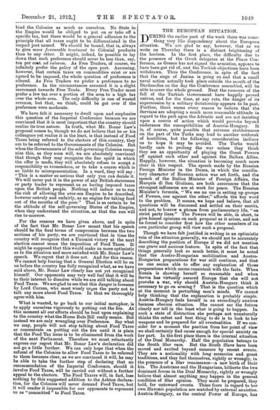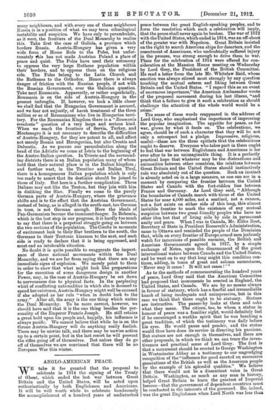THE EUROPEAN SITUATION.
DURING the earlier part of the week there was some- thing very like despondency about the European situation. We are glad to say, however, that as we write on Thursday there is a distinct brightening of the horizon. In the first place, the difficulty due to the presence of the Greek delegates at the Peace Con- ference, as Greece has not signed the armistice, appears to have been got rid of, and the Turkish objections have been withdrawn. Thus the Conference, in spite of the fact that the siege of Janina is going on and that a small naval action actually took place outside the mouth of the Dardanelles on the day the Conference assembled, will be able to cover the whole ground. Next the rumours of the fall of the Turkish Government have happily proved untrue, and for the time, at any rate, the danger of its supersession by a military dictatorship appears to be past. Further, there seems every reason to believe that the Servians are adopting a much more reasonable attitude in regard to the port upon the Adriatic and are not insisting upon a course of action which would provoke beyond endurance the susceptibilities of Austria-Hungary. It is, of course, quite possible that extreme stubbornness on the part of the Turks may lead to another outbreak of hostilities, but the following consideration inclines us to hope it may be avoided. The Turks would hardly care to prolong the war unless they think they see an opportunity of playing the Great Powers off against each other and against the Balkan Allies. Happily, however, the situation is becoming much more clear in this respect. The speech made by the Russian Foreign Minister in the Duma, in which the concilia- tory character of Russian action was set forth, and the speech of the Italian Minister of Foreign Affairs, the Marquis di San Giuliano, are both assurances that the strongest influences are at work for peace. The Russian Minister's formula, " We see no use in setting up groups of Powers, one against the other," affords the key word to the problem. It means, we hope and believe, that all questions will be discussed and settled on their merits, and not, to borrow a, phrase from parliamentary life, " on strict party lines." The Powers will be able, in short, to give honest opinions on each proposal as it arises, and not be forced to consider first how the other members of its own particular group will view such a proposal.
Though we have felt justified in writing in an optimistic vein of the situation generally, we should not be accurately describing the position of Europe if we did not mention one grave and anxious feature. In spite of the fact that things generally look so much better, it must be noted that the Austro-Hungarian mobilization and Austro- Hungarian preparations for war still continue, and that no one seems able to offer any explanation of those preparations which seems consistent with the facts. When Russia is showing herself so reasonable and when Servia has virtually assured Europe that she will not provoke a war, why should Austria-Hungary think it necessary to go on arming ? That is the question which at the moment is perturbing men's minds. We cannot help thinking that the explanation is probably simple. Austria-Hungary feels herself in an exceedingly anxious because obscure situation. She cannot see the future clearly nor tell in the least what is going to happen. In such a state of distraction she perhaps not unnaturally thinks the safest and best thing to do is to look to her weapons and be prepared for all eventualities. If we con- sider for a moment the position from her point of view we shall certainly find cause enough for special anxiety on her part. In the first place there is the internal situation of the Dual Monarchy. Half the population belongs to the South Slav race. But the South Slays have been moved and excited beyond measure by recent events. They are a nationality with long memories and great traditions, and they feel themselves, rightly or wrongly, in the presence of a Slav renaissance—a new birth of their kin. The Austrians and the Hungarians, hitherto the two dominant forces in the Dual Monarchy, rightly or wrongly believe that almost anything may happen in the present condition of Slav opinion. They must be prepared, they hold, for untoward events. These fears in regard to her own Slavonic population are matched by external anxieties. Austria-Hungary, as the central Power of Europe, has many neighbours, and with every one of these neighbours Russia is in a position of what we may term ethnological instability and suspicion. We have only to perambulate, as it were, the frontiers of the Dual Monarchy to realize this. Take first the case of Galicia, a province which borders Russia. Austria-Hungary has given a very wide form of Home Rule to the Poles, but unfor- tunately {Ibis has not made Austrian Poland a place of peace and quiet. The Poles have used their autonomy to oppress the very large Ruthene population within their borders, and to oppress them on the religious side. The Poles belong to the Latin Church and the Ruthenes to the Orthodox. Hence there is always danger of friction with the Russian people, if not with the Russian Government, over the Galician question. Take next Roumania. Apparently, or rather superficially, Roumania is on the side of Austria-Hungary in the present imbroglio. If, however, we look a little closer we shall find that the Hungarian Government is accused, and we fear not unjustly, of harsh treatment of the three million or so of Roumanians who live in Hungarian terri- tory. For the Roumanian Kingdom there is a "Roumania irredenta" question of a very large and serious kind. When we reach the frontiers of Servia, Turkey, and Montenegro it is not necessary to describe the difficulties of Austria-Hungary, for they are patent to all, and affect not merely Bosnia and Herzegovina, but also Croatia and Dalmatia. As we pursue our perambulation along the head of the Adriatic we come at Istria to the beginning of the Austro-Italian question. In Trieste and the surround- ing districts there is an Italian population many of whom hold that their natural place is in the Italian kingdom ; and further west, in the Trentino and Italian Tirol, there is a homogeneous Italian population which is only too ready to assert that its destinies should be joined to those of Italy. But here is a further complication. These Italians may not like the Teuton, but they join with him in disliking the Slay. Finally we come to the purely German parts of Austria-Hungary, where the grievance shifts and is to the effect that the Austrian Government, instead of being, as is alleged in the south-east, too German in tone, is not German enough. Here the ideals of Pan-Germanism become the imminent danger. In Bohemia, which is the last step in our progress, it is hardly too much to say that there is a perpetual struggle going on between the two sections of the population. The Czechs in moments of excitement look to their Slav brethren to the south, the Germans to their Teutonic kinsmen to the east, and each side is ready to declare that it is being oppressed, and must end an intolerable situation.
No doubt it is quite possible to exaggerate the import- ance of these national movements within the Dual Monarchy, and we are far from saying that there are any immediate signs of explosion. We merely point to them in order to show that what might look like preparations for the execution of some dangerous design in another Power, may, in the case of Austria-Hungary be set down to nervousness due to physical facts. In the perplexing whirl of conflicting nationalities in which she is doomed to spend her existence, Austria-Hungary might well be excused if she adopted as her rule "when in doubt look to the army." After all, the army is the one thing which unites the Dual Monarchy. To be more correct, however, we should have said that it is the one thing besides the per- sonality of the Emperor Francis Joseph. He still retains a great hold upon his people and, happily, his influence is always pacific. We cannot believe that while he is on the throne Austria-Hungary will do anything really foolish. There may be unwise talk, and there may be unwise action up to a certain point, but in the last resort he will prevent the rifles going off of themselves. But unless they do go off of themselves we are convinced that there will be no European War this winter.











































 Previous page
Previous page